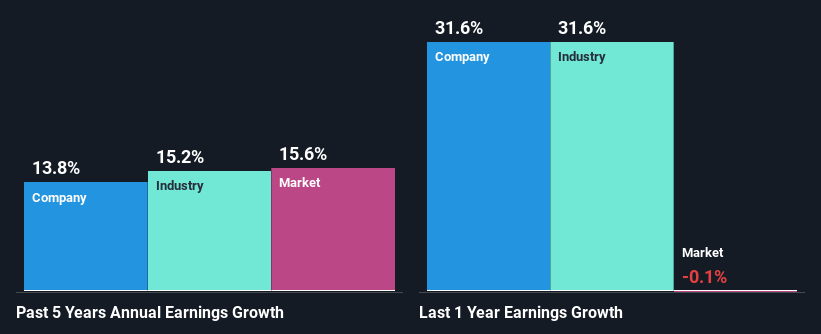Are Robust Financials Driving The Recent Rally In Southern Cross Electrical Engineering Limited's (ASX:SXE) Stock?
Southern Cross Electrical Engineering (ASX:SXE) has had a great run on the share market with its stock up by a significant 23% over the last three months. Given that the market rewards strong financials in the long-term, we wonder if that is the case in this instance. Specifically, we decided to study Southern Cross Electrical Engineering's ROE in this article.
Return on equity or ROE is a key measure used to assess how efficiently a company's management is utilizing the company's capital. In simpler terms, it measures the profitability of a company in relation to shareholder's equity.
Check out our latest analysis for Southern Cross Electrical Engineering
How Is ROE Calculated?
The formula for return on equity is:
Return on Equity = Net Profit (from continuing operations) ÷ Shareholders' Equity
So, based on the above formula, the ROE for Southern Cross Electrical Engineering is:
11% = AU$20m ÷ AU$182m (Based on the trailing twelve months to June 2023).
The 'return' is the amount earned after tax over the last twelve months. That means that for every A$1 worth of shareholders' equity, the company generated A$0.11 in profit.
What Has ROE Got To Do With Earnings Growth?
Thus far, we have learned that ROE measures how efficiently a company is generating its profits. We now need to evaluate how much profit the company reinvests or "retains" for future growth which then gives us an idea about the growth potential of the company. Assuming all else is equal, companies that have both a higher return on equity and higher profit retention are usually the ones that have a higher growth rate when compared to companies that don't have the same features.
Southern Cross Electrical Engineering's Earnings Growth And 11% ROE
At first glance, Southern Cross Electrical Engineering seems to have a decent ROE. Even when compared to the industry average of 12% the company's ROE looks quite decent. This certainly adds some context to Southern Cross Electrical Engineering's moderate 14% net income growth seen over the past five years.
We then performed a comparison between Southern Cross Electrical Engineering's net income growth with the industry, which revealed that the company's growth is similar to the average industry growth of 15% in the same 5-year period.
Earnings growth is an important metric to consider when valuing a stock. What investors need to determine next is if the expected earnings growth, or the lack of it, is already built into the share price. By doing so, they will have an idea if the stock is headed into clear blue waters or if swampy waters await. Has the market priced in the future outlook for SXE? You can find out in our latest intrinsic value infographic research report
Is Southern Cross Electrical Engineering Efficiently Re-investing Its Profits?
While Southern Cross Electrical Engineering has a three-year median payout ratio of 72% (which means it retains 28% of profits), the company has still seen a fair bit of earnings growth in the past, meaning that its high payout ratio hasn't hampered its ability to grow.
Additionally, Southern Cross Electrical Engineering has paid dividends over a period of at least ten years which means that the company is pretty serious about sharing its profits with shareholders.
Summary
Overall, we are quite pleased with Southern Cross Electrical Engineering's performance. Especially the high ROE, Which has contributed to the impressive growth seen in earnings. Despite the company reinvesting only a small portion of its profits, it still has managed to grow its earnings so that is appreciable. So far, we've only made a quick discussion around the company's earnings growth. So it may be worth checking this free detailed graph of Southern Cross Electrical Engineering's past earnings, as well as revenue and cash flows to get a deeper insight into the company's performance.
Have feedback on this article? Concerned about the content? Get in touch with us directly. Alternatively, email editorial-team (at) simplywallst.com.
This article by Simply Wall St is general in nature. We provide commentary based on historical data and analyst forecasts only using an unbiased methodology and our articles are not intended to be financial advice. It does not constitute a recommendation to buy or sell any stock, and does not take account of your objectives, or your financial situation. We aim to bring you long-term focused analysis driven by fundamental data. Note that our analysis may not factor in the latest price-sensitive company announcements or qualitative material. Simply Wall St has no position in any stocks mentioned.

